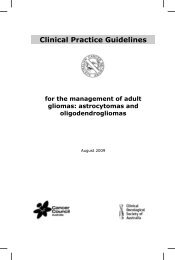Clinical Practice Guidelines for the management of locally advanced ...
Clinical Practice Guidelines for the management of locally advanced ...
Clinical Practice Guidelines for the management of locally advanced ...
Create successful ePaper yourself
Turn your PDF publications into a flip-book with our unique Google optimized e-Paper software.
Evidence summary Level References<br />
For men with metastatic disease:<br />
orchidectomy and LHRH agonist have similar effects on overall<br />
survival<br />
medical or surgical castration appear to provide a survival<br />
benefit when compared with anti-androgen (steroidal or non<br />
non-steroidal) mono<strong>the</strong>rapy.<br />
Recommendation<br />
I & II 1-5<br />
Patients with metastatic prostate cancer can be treated with ei<strong>the</strong>r orchidectomy or LHRH<br />
agonist based on patient preference. Anti-androgen mono<strong>the</strong>rapy should be avoided as<br />
<strong>the</strong> data indicate this is probably associated with a shorter overall survival.<br />
Grade C<br />
5.1.2 Single agent versus total androgen blockade<br />
Castration <strong>the</strong>rapies are effective but temporary <strong>the</strong>rapies <strong>for</strong> metastatic disease, but are justifiable in<br />
context <strong>of</strong> preventing potential androgen “flare” to avoid fur<strong>the</strong>r impingement if <strong>the</strong>re were o<strong>the</strong>r<br />
areas <strong>of</strong> metastatic disease that may already be causing significant but not clinical evidence <strong>of</strong> cord<br />
compression. Numerous RCTs have examined whe<strong>the</strong>r combined androgen blockade (CAB) might<br />
provide a survival benefit when compared with castration mono<strong>the</strong>rapies in <strong>the</strong> treatment <strong>of</strong><br />
metastatic (M1) prostate cancer. Most <strong>of</strong> <strong>the</strong>se trials have been <strong>the</strong> subject <strong>of</strong> three meta-analyses 6-8 ,<br />
with <strong>the</strong> largest <strong>of</strong> <strong>the</strong>se 8 following up all 8275 participants in 27 RCTs.<br />
There is some heterogeneity in study design in this extensive body <strong>of</strong> literature, It includes some trials<br />
using steroidal anti-androgens and o<strong>the</strong>rs using non-steroidal anti-androgens in combination with<br />
orchidectomy or LHRH agonist. Ano<strong>the</strong>r source <strong>of</strong> heterogeneity was <strong>the</strong> inclusion in some studies <strong>of</strong><br />
patients with <strong>locally</strong> <strong>advanced</strong> disease (M0) along with patients with radiographic evidence <strong>of</strong> disease<br />
(M1). However, over 80% <strong>of</strong> men included in <strong>the</strong> largest meta-analyses had metastatic disease.<br />
The overall results <strong>of</strong> <strong>the</strong> meta-analyses demonstrate ei<strong>the</strong>r no significant benefit 8 or only a small<br />
benefit 7 when results <strong>for</strong> both steroidal and non-steroidal anti-androgens were combined. The<br />
inconsistencies could be explained by <strong>the</strong> heterogeneous nature <strong>of</strong> <strong>the</strong> studies. More specifically,<br />
however, <strong>the</strong> use <strong>of</strong> cyproterone acetate appears to be detrimental (<strong>the</strong> difference in mortality rates<br />
was 2.8%) in <strong>the</strong> largest meta-analyses 8 whereas non-steroidal anti-androgens were associated with a<br />
modest but significant improvement, with a difference in mortality rates <strong>of</strong> 2.9% 8 and an odds ratio<br />
<strong>for</strong> overall survival <strong>of</strong> 1.29 at five years. 6<br />
The number <strong>of</strong> patients who die <strong>of</strong> metastatic prostate cancer each year (second leading cause <strong>of</strong> male<br />
cancer deaths) and <strong>the</strong> overall survival benefit indicates that <strong>the</strong>se data are <strong>of</strong> significant clinical<br />
relevance. The modest increase in overall survival, however, is balanced against <strong>the</strong> increased side<br />
effects <strong>of</strong> adding a non-steroidal anti-androgen to androgen deprivation (castration) <strong>the</strong>rapy and this<br />
limits <strong>the</strong> clinical impact or usability <strong>of</strong> combined androgen blockade <strong>for</strong> all patients.<br />
The data can be directly generalised to patients with metastatic prostate cancer as both LHRH agonists<br />
and anti-androgens are on <strong>the</strong> PBS <strong>for</strong> this indication and orchidectomy is an easily accessible<br />
procedure.<br />
51<br />
Overt metastatic disease and/or loco-regional progressive disease



